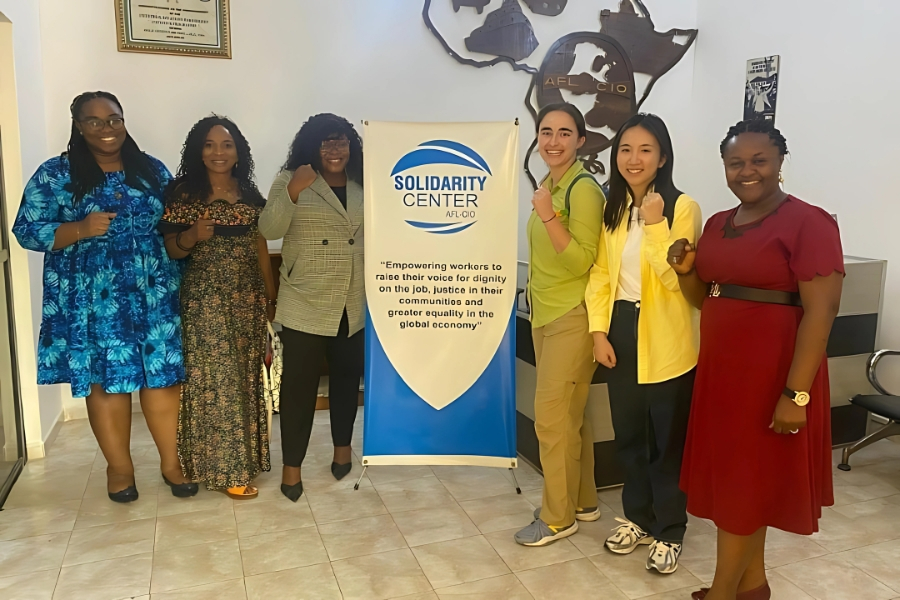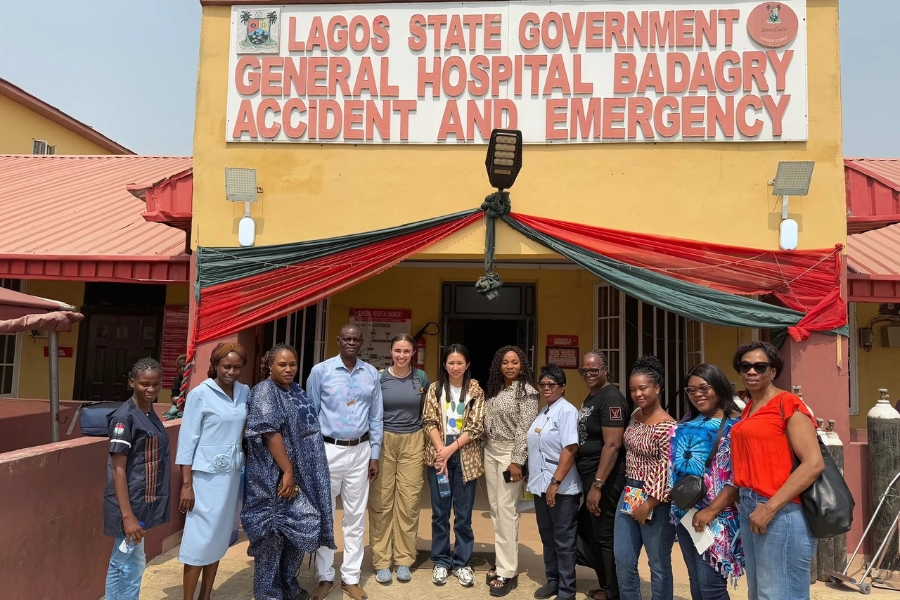SAIS Students Conduct Insightful Research on Nigeria’s Care Economy

From September 2024 to April 2025, four Johns Hopkins SAIS students participated in a multi-phase research practicum as part of the SAIS Women Lead program. Partnering with the Solidarity Center, a Washington, D.C.-based nonprofit that promotes the rights of workers around the world, the students explored the intersections of public policy, economic development, and gender equity through a focused study on Nigeria’s care economy, a sector largely powered by the labor of women in both formal and informal roles.
Under the guidance of Vice Dean Chiedo Nwankwor, the student team, comprising Chloe Ross Bohn, Haoran Wang, Linyi Zheng, and Nourah Gargash, examined how strategic investments in healthcare and social infrastructure could advance gender equity, improve labor conditions for care workers, and generate long-term economic returns. Chloe Ross Bohn and Haoran Wang traveled over their winter break in January to conduct fieldwork in Abuja, Nigeria’s capital city, and Lagos, the commercial capital.
The practicum’s research design integrated a robust mixed-methods approach, combining quantitative surveys with qualitative semi-structured interviews and focus group discussions. Students heard from over 250 participants, including healthcare workers, government officials, union representatives, and civil society leaders. The team also developed a social accounting matrix, an economic modeling tool that traces how public spending in the care sector flows through the broader economy.
“We designed our report to reflect the voices of care workers on the ground,” said Bohn, one of the two participants in the fieldwork. “Many care workers face long hours, low pay, limited job security, and little recognition, despite being essential to the health and well-being of their communities. Our work aimed to both quantify and describe their contributions, capturing care work as a key pillar of inclusive development.”
The team’s findings revealed critical structural challenges in Nigeria’s care ecosystem: severe workforce shortages, weak regulatory enforcement, urban-rural disparities in infrastructure, and the ongoing migration of skilled professionals in search of better opportunities abroad. Gender-based inequities were also deeply entrenched: women, who comprise over 90% of frontline care workers, are disproportionately overburdened and under-recognized.
“Our qualitative interviews were incredibly revealing,” said Wang about the fieldwork experience. “From nurses in Gwagwalada [an Abuja suburb] to community health workers in Badagry [a satellite city near Lagos], we heard stories of resilience, frustration, and deep commitment to serving their communities. But we also heard about burnout, low pay, and safety concerns that make it difficult for workers to remain in the profession.”
To complement these narratives, the social accounting matrix analysis modeled how increased public healthcare investment could drive economic growth. While initial results showed only marginal gains in GDP, a closer look revealed that strategic spending, such as investment in training, job formalization, and rural retention, could yield significant improvements in labor productivity, household income, and domestic reinvestment over time.
The team also identified leakages in the care economy, where spending on imported medical equipment and pharmaceuticals limited the impact of domestic investments. “Strengthening local supply chains and embedding care investment within Nigeria’s broader development strategy could dramatically amplify economic returns,” said Linyi Zheng, who led the team’s quantitative analysis.
Union leaders and community members emerged as critical allies in the fight for better conditions. Through stakeholder engagement sessions, the team learned how trade unions are working to formalize informal labor, advocate for fair wages, and push for gender-responsive policy reforms.
The Solidarity Center now has a data-rich advocacy tool that not only highlights the economic value of care work, but also maps out tangible policy pathways forward. This practicum exemplifies what SAIS does best: linking theory to practice and empowering students to generate real-world impact.
The practicum will conclude with a public presentation of the findings to partners and faculty in May 2025, and the final report will be published shortly thereafter. The team members hope their work will inform future development strategies and strengthen the voice of care workers across Nigeria. As the global conversation around care work and gender equality continues to evolve, this project places SAIS students at the forefront, advancing not only academic inquiry but also inclusive and sustainable solutions.
Enjoyed reading about Research on Nigeria’s Care Economy? Explore all that our Washington, D.C. campus has to offer.